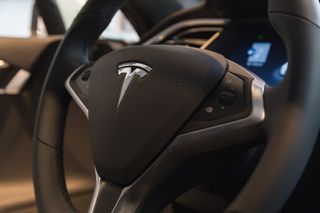Tesla's master plan targets Uber with autonomous cars
Elon Musk reveals plans for solar power, smart trucks, and "sharing" your autonomous Tesla

Elon Musk has revealed his "master plan" for the future of car company Tesla, with an eye on solar power, trucks and public transport, and taking on Uber with its autonomous cars.
Musk laid out the details in a blog post, following up a first "master plan" written a decade ago that explained his strategy for Tesla cars.
In "part two" of his master plan, Musk said that once self-driving cars are approved by regulators, Tesla owners will be able to "summon" their cars from anywhere. "Once it picks you up, you will be able to sleep, read or do anything else en route to your destination."
There's another feature that may have Uber concerned: you'll also be able to add your car to the "Tesla Shared Fleet", letting it pick up other people to "generate income for you while you're at work or on vacation".
Musk pointed out this will help pay off your car, making the pricey Teslas more affordable. "This dramatically lowers the true cost of ownership to the point where almost anyone could own a Tesla," he said. "Since most cars are only in use by their owner for five per cent to ten per cent of the day, the fundamental economic utility of a true self-driving car is likely to be several times that of a car which is not."
Tesla isn't the only one hoping to "share" its driverless cars: Uber is also developing autonomous vehicles.
Autopilot admission
Get the ITPro. daily newsletter
Receive our latest news, industry updates, featured resources and more. Sign up today to receive our FREE report on AI cyber crime & security - newly updated for 2024.
Musk said all Tesla vehicles will be fully self-driving in the future, though he admitted the software would take time to perfect. Acknowledging the recent death of a Tesla driver, he claimed that even in beta, the partially autonomous "Autopilot" system remains safer than human drivers.
"I should add a note here to explain why Tesla is deploying partial autonomy now, rather than waiting until some point in the future," he said. "The most important reason is that, when used correctly, it is already significantly safer than a person driving by themselves and it would, therefore, be morally reprehensible to delay release simply for fear of bad press or some mercantile calculation of legal liability."
Musk said Tesla would drop the "beta" label for Autopilot when the system is "ten times safer than the US vehicle average".
Trucks and buses
Musk said Tesla would expand the types of vehicles it makes to include a compact SUV and a pickup truck, as well as heavy-duty lorries and high passenger-density urban transport, perhaps better known as "buses".
Of the latter two, Musk said both are in development and will be unveiled next year.
"We believe the Tesla Semi will deliver a substantial reduction in the cost of cargo transport while increasing safety and making it really fun to operate," he added, though he didn't explain how driving a truck would be made "fun".
The goal with the Tesla bus is to use autonomous technologies to "transition the role of bus driver to that of fleet manager," an idea that won't have many bus drivers celebrating Musk's plans.
Passengers may be more enthusiastic. "Traffic congestion would improve due to increased passenger areal density by eliminating the centre aisle and putting seats where there are currently entryways, and matching acceleration and braking to other vehicles, thus avoiding the inertial impedance to smooth traffic flow of traditional heavy buses," he said. "It would also take people all the way to their destination. Fixed summon buttons at existing bus stops would serve those who don't have a phone."
Alongside the smart car details, Musk said he was bringing together Tesla with his SolarCity company, in order to use solar power with cars in the future, to "create a smoothly integrated and beautiful solar-roof-with-battery product that just works". Tesla recently bought SolarCity, which critics have seen as a bailout of the struggling firm.




